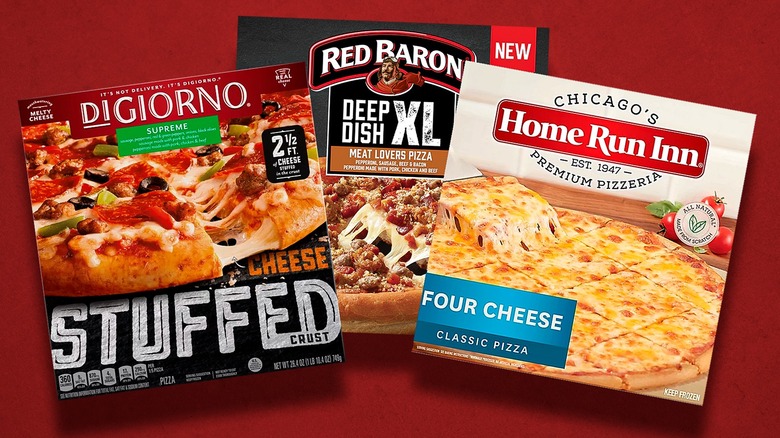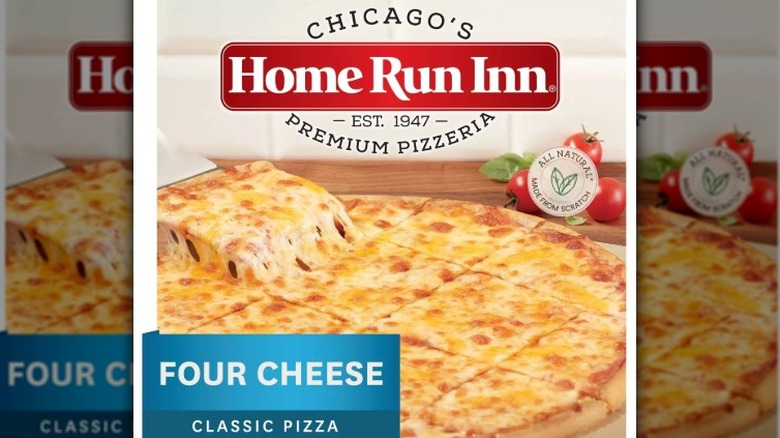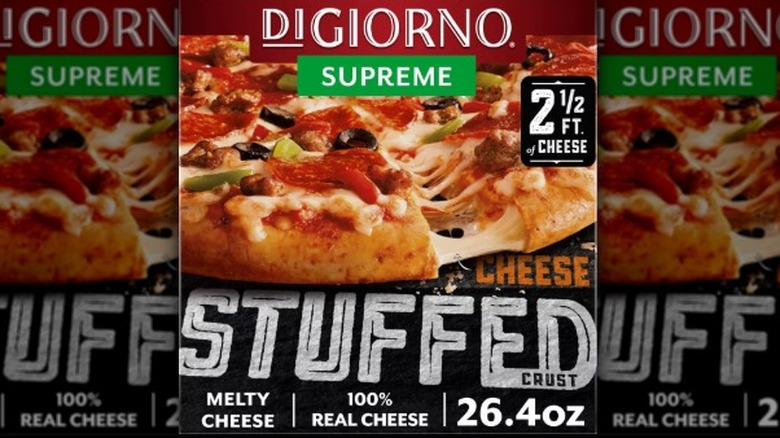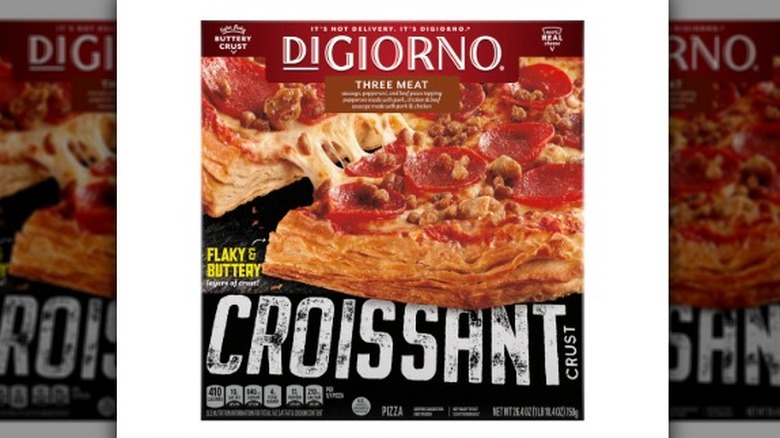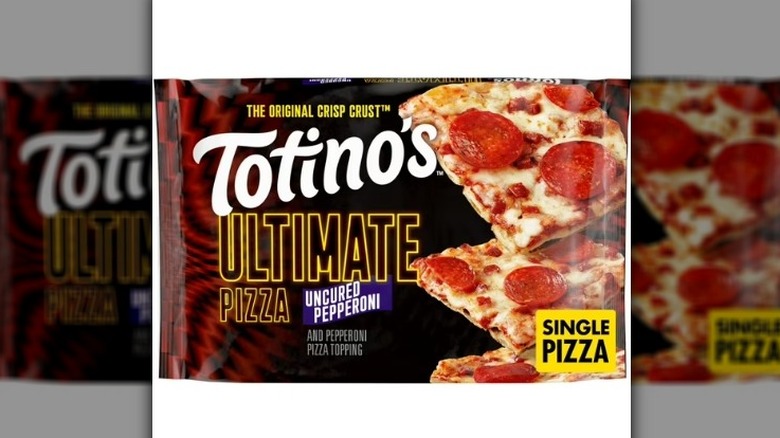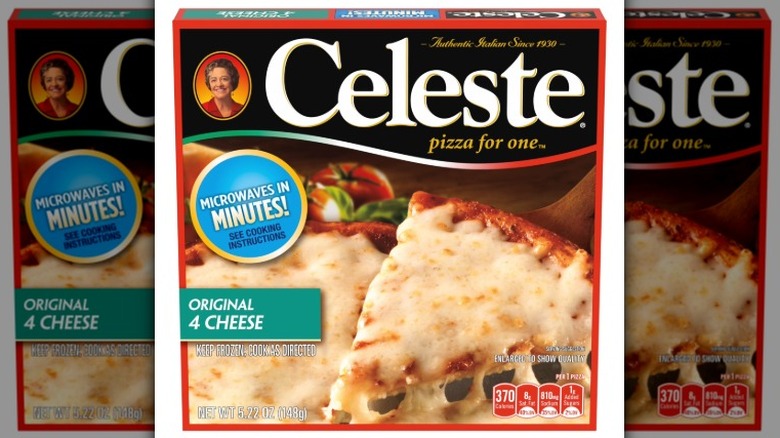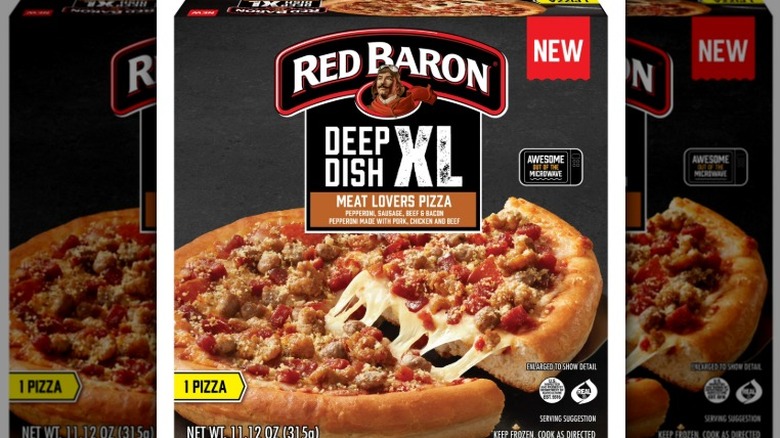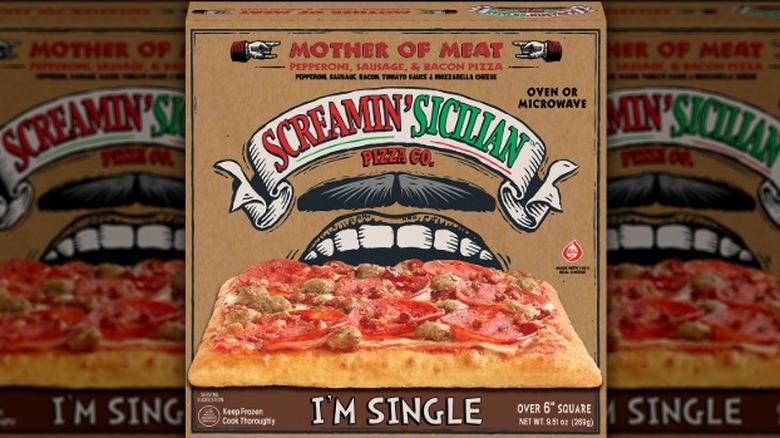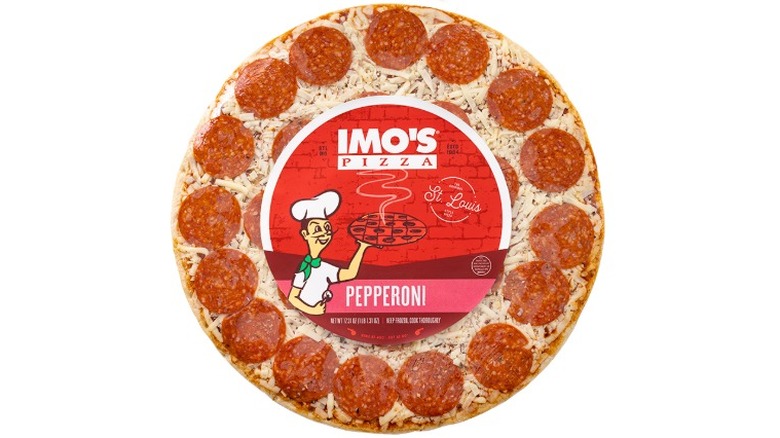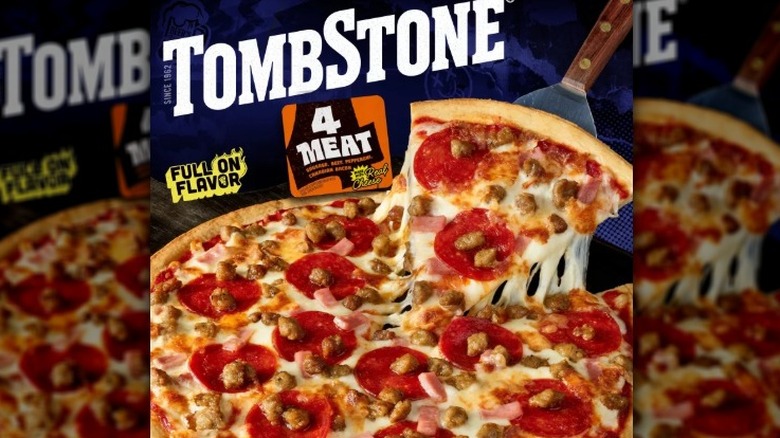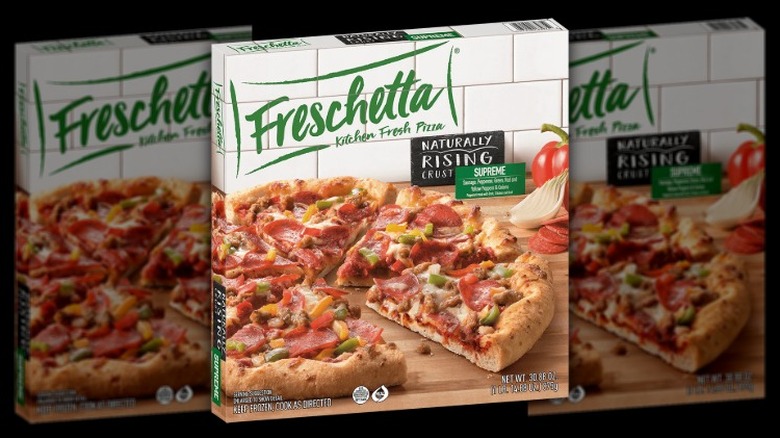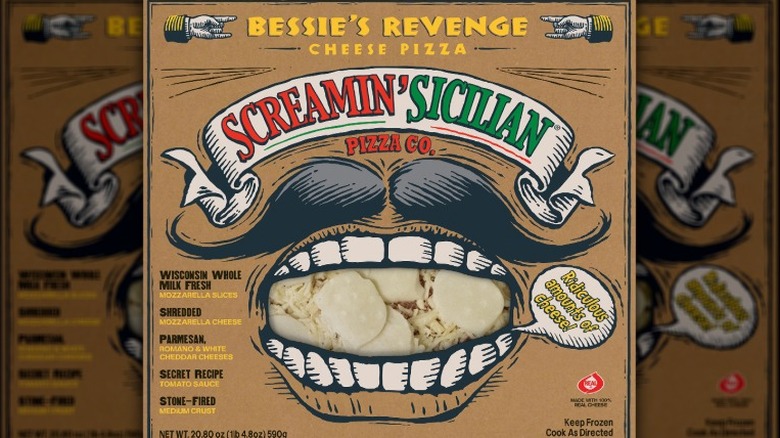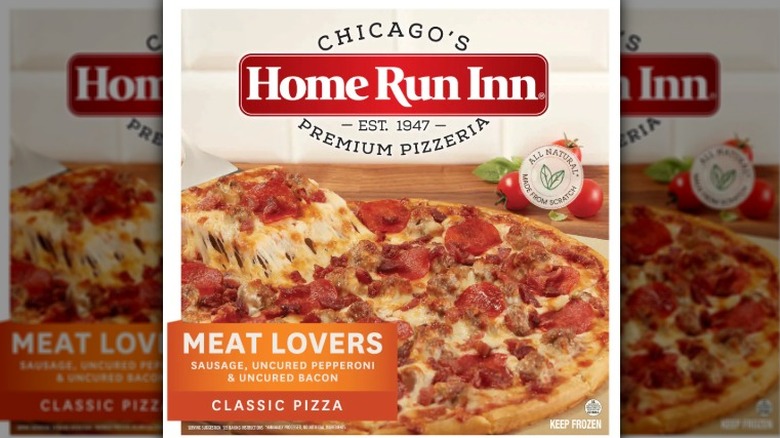These Are The Most Unhealthy Frozen Pizzas You Can Buy
We may receive a commission on purchases made from links.
Most people will agree that a frozen pizza is one of the best frozen foods. Cheese, crust, sauce, and any toppings your heart desires, what's not to love? But the first word that comes up in relation to these pies is probably not "healthy." That's not to say these pizzas should never be eaten. On the contrary, they can be incorporated into a healthy diet by checking nutrition fact labels and pairing them with sides like nutrient-rich vegetables. There are even plenty of healthy frozen pizza options to choose from.
But the pizzas on the low end of the health spectrum usually far exceed the recommended daily values for certain ingredients. Excessive amounts of sodium and saturated fat, both of which frozen pizzas have in abundance, are linked to high blood pressure and heart disease. This, alongside other additives, can make even a small serving add up quickly. We took a look at the amount of calories, sodium, and fat — and some other questionable ingredients in some cases — per serving and used the information gathered to round out this list of some of the most unhealthy frozen pizzas available to buy.
Home Run Inn Classic Four Cheese Pizza
Chicago's favorite frozen pizza knocks it out of the park in popularity. But that's not the only thing about this brand that turns heads. Home Run Inn's Classic Four Cheese Pizza, in particular, far exceeds our expectations when it comes to sodium, coming in at 1,400 milligrams of sodium per 147 gram serving. That's 61% of the daily recommended intake for sodium in just one slice of this pie. One slice, or ⅕ of the pizza, also has 500 calories and 25 grams of fat.
Sodium isn't all bad. In fact, your body does need a certain amount of sodium to function. But, the American Heart Association's recommendation is to consume no more than 2,300 milligrams daily. The ideal number is even lower than that at 1,500 milligrams per day. That means if you eat just one slice of this pizza, and who really does that, you'll come in just 100 milligrams shy of the ideal daily limit. Sodium adds up quickly throughout the day and is linked to higher blood pressure and heart disease. So while this pizza may be a winner in flavor, it might not be so victorious when it comes to health.
DiGiorno Stuffed Crust Supreme Pizza
DiGiorno is perhaps one of the most well-known names in the frozen pizza world. The company's famous catchphrase, "it's not delivery, it's DiGiorno," tells customers that these frozen pizzas rival the experience of a freshly delivered pie. To live up to its name, DiGiorno goes big or goes home. This is evident in its Stuffed Crust Supreme Pizza which apparently has loads of cheese packed into its crust alone. Add onto that a thick layer of mozzarella cheese, pepperoni, and sausage, and this pizza really packs a punch.
One serving (150 grams) contains 360 calories and 870 milligrams of sodium. One slice also has 19 grams of fat. Almost half of this number comes from saturated fats which are the kinds of fats that doctors recommend avoiding as much as possible. While healthy fats like avocados and olive oil keep your body feeling good, saturated fats can raise bad cholesterol levels.
DiGiorno Three Meat Croissant Crust Pizza
If a frozen pizza wasn't rich enough, this special concoction from DiGiorno levels up the classic by combining it with a well-loved French pastry: the croissant. The combination of buttery croissant layers and meaty, cheesy pizza seems like a recipe for success, though not necessarily the most health-forward pick. One slice (133 grams) of this unique pizza comes in at 350 calories and 17 grams of fat. It also has 780 milligrams of sodium — 34% of the daily recommended value.
Croissants themselves are already fairly high in all three of these areas. The complicated process of laminating croissant dough means that lots of butter is folded throughout the dough. And with high amounts of butter comes high amounts of fats, including saturated fats, and calories. Although DiGiorno probably isn't laminating its croissant crusts by hand, French-Patisserie style, the addition of this extra buttery crust drops the health value on this pizza quite a bit. Plus, a taster here at The Takeout tried one of the brand's croissant crust varieties and found it to be the worst DiGiorno frozen pizza, so this one probably isn't worth your time.
Totino's Ultimate Pepperoni Party Pizza
Totino's is a brand that immediately inspires childhood nostalgia. Many of us have memories of getting home from school to throw some Totino's Pizza Rolls in the microwave and dig in before they even had the chance to cool down. Burnt tongues aside, however, fewer of us probably took note of the downsides to our favorite brand's food selections — namely, how unhealthy they were. Most of Totino's frozen options are high in sodium and fat, while also containing lots of extra food additives. BHA, BHT, and TBHQ are some of the additives that have been linked to negative health effects, even carcinogenic ones.
One of Totino's newest releases, the Ultimate Pepperoni Party Pizza is no exception. This new and improved version of the brand's classic Pepperoni Party Pizza is marketed as having even more meat and cheese than the original. These extras contribute to a high calorie count of 440 per serving, with 24 grams of fat, and 940 milligrams of sodium. The serving size here is actually half of the pizza. Given its smaller overall size compared to other frozen pizzas, it's not hard to imagine eating the full pizza in one go, making portion control another potential issue. Totino's even suggests the product as an after-school snack, but we can think of a few better ways to keep the kids fueled and happy.
Celeste Original 4 Cheese Pizza
Celeste brand pizza is another that takes us back to the good ole days. Before venturing into the frozen pizza business, Celeste Lizio and husband, Anthony, started in the restaurant business. And 25 years later, they were shipping out their pies to restaurants much like the ones they used to run. Even after being acquired by Quaker Oats, Celeste continued to feature in commercials that emphasized the brand's authentic, Italian family roots.
But the brand's wholesome image doesn't necessarily translate to wholesome frozen pizza ingredients. The Celeste Original 4 Cheese Pizza has 370 calories and 810 milligrams for the single-serve pizza (148 grams) — it also contains 15 grams of fat. But these numbers aren't the most concerning thing about this pizza. Instead, it's an unassuming ingredient you may even overlook when perusing the label on the back of the box: titanium dioxide. This is a color additive that is often labeled simply as "artificial color" on food labels, making it even harder to spot. In pizzas, it's often used to give the cheese a whiter, more appealing appearance, as it is in Celeste's imitation mozzarella blend. It also happens to be a common sunscreen ingredient. While it is deemed safe in foods regulated by the Food and Drug Administration, we'll leave this ingredient on the beach rather than add it to our plates.
Red Baron Deep Dish XL Meat Lovers Pizza
Red Baron is yet another big name in the pizza game. According to its own website, it's the "most popular frozen pizza in America." While we can't verify the legitimacy of that claim, what we can say is that it's a good thing Red Baron doesn't market itself as the healthiest frozen pizza in America. One serving (158 grams) of its Deep Dish XL Meat Lovers Pizza has 460 calories and 1,020 milligrams of sodium. There's also 25 grams total of fat, with 12 grams being the unhealthy saturated kind. That's over half the amount of saturated fats one person should generally have in a day.
This pizza actually serves two people. However, Red Baron markets this variety on its website as pizza "singles," much like its Deep Dish and French Bread Pizza Singles. The difference is, those come with two individual pizzas, each one being its own serving. Even though the Deep Dish XL Pizza isn't a single serving, the small size and marketing similarities can mislead a customer to eat more than they intend to. Popular or not, it's clear why this is one of the store-bought frozen pizzas you should steer clear of.
Screamin' Sicilian Mother of Meat Single Pizza
Single-serve pizzas might seem like a better choice for a few reasons, some of which can actually be true. Since single-serve pizzas come pre-portioned, it's easier to avoid eating a pizza meant for six people all in one go. You might also think that the nutrition labels on these pizzas would be a little more toned down, seeing as only one person will be eating them. However, the opposite is often true. A personal pizza is seen more as a whole meal, so the recommended serving size tends to be larger than that of a slice out of a larger pizza.
Screamin' Sicilian's Mother of Meat Single Pizza is one serving at 269 grams, while a serving of the brand's shareable Mother of Meat pizza is only 133 grams. The single-serve portion also outdoes the original in fat, sodium, and calories. While a serving of the large pizza has 340 calories and 800 milligrams of sodium, the personal pie has 750 and 1,900, respectively. The Mother of Meat Single also has 40 grams of fat per serving, twice that of the standard size. So next time you're craving pizza, you might be better off having a slice or two out of a standard-sized pie and pairing it with some leafy greens on the side for a nutrient boost. Plus, who doesn't love leftovers?
Imo's Pepperoni Pizza
As an acclaimed St. Louis classic, Imo's has been making pizzas since the 1960s. It started as a family-owned business and expanded to having almost 100 pizza parlors and selling products in grocery stores across the United States. One of the most unmistakable aspects of an Imo's St. Louis-style pizza is the cheese. This is not your regular mozzarella covered pizza. Imo's uses Provel, a unique blend of cheddar, Swiss, and provolone cheeses that originated in 1947. While this soft, melty topping has the hearts of many, it is actually not considered a real cheese by the FDA. Rather, it's considered a pasteurized, processed cheese. Like American cheese, it is much more processed than other cheeses and high in fat and sodium.
Not just the special "cheese" topping but, Imo's pizza, in general, doesn't score high in the health department. Imo's Pepperoni Pizza has a total of 470 calories, 23 grams of fat, and 1,304 milligrams of sodium per serving (164 grams). But there's another sneaky ingredient in this pie that you should look out for. The crust contains Potassium Bromate, used to help dough rise quickly and come out nice and fluffy. It is also a potentially carcinogenic ingredient reportedly linked to cancer through animal testing. As such, it has been banned in places like the U.K. and Canada. While the FDA has not done the same in the United States, it has encouraged bakers to avoid using the additive.
Tombstone Original Thin Crust 4 Meat Pizza
Meat lovers pizza is a crowd favorite. Instead of a simple pepperoni pie, you get a variety of meaty toppings with different flavor profiles and textures to enjoy. But keep in mind that all that meat on one pizza means you're also getting triple the fat and sodium, if not more. This is especially true when processed meats are used, which is often the case. Tombstone goes as far as using four different processed meats in its Original Thin Crust 4 Meat Pizza. The combination of pepperoni, beef topping, sausage, and bacon makes this pizza a hard pass if you're looking for a healthy option. In total, one serving (150 grams) has 370 calories, 18 grams of fat, and 870 milligrams of sodium.
Instead of meat-heavy pizzas like this one, try looking for varieties with more vegetable toppings. If you're still craving meat, opt for chicken-topped pies instead of ones with processed meats. Of course, the toppings don't necessarily make a frozen pizza a health food but they can supply some much-needed nutrients and help you avoid digging into too many preservatives. Meat lovers is unfortunately a no-go but if Tombstone introduces a 4 Vegetable pizza next, we might give it a try.
Freschetta Naturally Rising Crust Supreme Pizza
Freschetta proudly markets its products as containing premium ingredients only. But premium doesn't always mean better. While the green color scheme on the box and the "fresh" in the name scream healthy, the nutrition facts do not. The Freschetta Naturally Rising Crust Supreme Pizza has 820 milligrams of sodium per serving (146 grams) and 15 grams of total fat. It also has a suboptimal 350 calories in each serving. This is another one of those pizzas that has both pepperoni and sausage to top it off, making it a saltier and fattier pie, overall.
Compared to most of the other pizzas on this list, Freschetta does have less overall additives and seemingly more vegetables, but upon closer inspection the ratio of vegetables to bread, meat, and cheese isn't really balanced. A healthier choice would be something with mostly vegetables and even ones that are more nutrient-dense than you might normally see on a pizza, like broccoli. This pizza also contains hydrogenated soybean oil. Hydrogenated oils may not be banned like their partially-hydrogenated counterparts but they still aren't great for your body. These oils are high in saturated fats and should be limited whenever possible.
Screamin' Sicilian Bessie's Revenge Cheese Pizza
Screamin' Sicilian is another brand that prides itself on using fresh, quality ingredients in its frozen pizzas. The brand is so proud of its ingredients, in fact, that it puts them on full display. A peek through the mouth-shaped cut-out on a box of Bessie's Revenge Cheese Pizza will instantly clue you in to just how much cheese this pie packs. Piled on top is both shredded and sliced mozzarella, Parmesan, Romano, and white cheddar. The extra mozzarella slices on top are even sourced straight from the state that produces the most cheese, Wisconsin.
Of course, cheese does have many health benefits. It has calcium and protein that your body needs. Plus, cheeses like mozzarella are much healthier than more processed ones like American cheese. However, moderation is key, and this pie is the opposite of moderation. Whole milk cheeses like the mozzarella on Bessie's Revenge are often high in saturated fat. One 147 gram serving of this pizza has a total of 18 grams of fat and 50% of the saturated fat you should eat in a day. Cheese is also high in calories and sodium. This pizza has 360 calories and 720 milligrams of sodium in each serving.
Home Run Inn Classic Meat Lovers Pizza
Home Run Inn calls itself a pioneer of frozen pizza. The company's first foray into freezing its pies began way back in the 1960s. Since then, its commitment to all-natural ingredients has been at the forefront of the brand's marketing. The meats and cheeses used in these pizzas are said to be as fresh as possible, without the additives that most other frozen pizzas contain. The words "all-natural" are even highlighted alongside a leafy green emblem on the front of the Home Run Inn's Classic Meat Lovers Pizza box. But turn the box over and you'll quickly realize that just because the product is all-natural, doesn't mean you can count on it to be a healthy choice.
One out of the six servings, which is equal to 151 grams, in this pizza packs a whopping 1,060 milligrams of sodium. The calories are not much better, coming in at a high of 440 calories per serving. Add onto that 24 grams of fat and the benefits of the natural ingredients are all but canceled out. Looking for natural ingredients is a great first step, but checking the label can give you the information you need to make an informed choice. There may be no limit to how much frozen pizza Americans can consume, but there can be a limit to just how unhealthy your favorite slice is.
